- Home
- Kenneth Eade
Paladine Page 3
Paladine Read online
Page 3
“I will, I will.”
“Good. At the front desk in your building, you’ll find a message from me. Don’t tell anybody about this. If I see you talking to anyone, all bets are off.”
“Can you see me?”
“No questions. First step is to go and get that message. Next, take it back to the apartment and read it.”
“Now? But it’s one in the morning.”
“Yes, now.”
Robert focused his night vision goggles on the lobby of Williamson’s building from his comfortable spot in the shadows. Five minutes later, Williamson appeared at his concierge’s desk in a brown bathrobe.
Probably has his initials monogrammed on it.
Robert watched carefully as Williamson took the package containing the message and a disposable cell phone.
Back upstairs, Williamson closed the door of his apartment and ripped open the manila envelope. He dropped the mobile phone onto his desk and unfolded the paper that had been wrapped around it. The note, written with a laser printer, read:
Don’t use this phone in your apartment. It is not safe. Don’t even turn it on until you are out. Tomorrow afternoon at 12 pm, get on the cable car at the California Street end of the line. Then, turn on the phone. Don’t turn it on before that time. I will be in touch. Now take this message into the bathroom and, with a cigarette lighter, burn it over the toilet and flush the ashes.
Bryce did as he was instructed. He coughed and sputtered as he burned the message, then hacked up some phlegm and spit it into the toilet before he flushed the ashes. He scrambled to the medicine cabinet, withdrew a package of valium and took 10 milligrams. There would be no sleeping without it.
As Bryce settled into his king-size bed, Robert walked the meeting route backwards to the point of its origin. When he was satisfied, he headed back to the Bradley Hotel. Tomorrow marked the first day of his new career, or the end of life as he knew it.
CHAPTER EIGHT
Robert Garcia spotted Bryce Williamson waiting in line at the California Street cable car turntable and scanned the area for others who may be observing him. He dialed the number of the throwaway cell phone.
“You’re doing good, B. Get on the second car and call me when you’re moving.”
Bryce coughed and sputtered. He was a little frustrated because the first car had not taken off yet and the second would not be moving for a while, but he waited as he had been told. As the first car began to move, Robert streaked out of the crowd, hopped on the side of it and held on to a handrail. He rode the car all the way to Montgomery Street and jumped off.
The second car was finally packed up and began to move. Bryce extracted the gifted phone from his jacket pocket and called the last and only number which had rung it.
“Hello?”
“Good, B. You’re doing well. Now, I want you to ride the cable car until you get to Powell, then get out and take the Powell car toward Chinatown.”
“But I can get out in Chinatown right at California.”
“Please follow my instructions, or I’m out of here.”
“Okay, okay.” Bryce coughed and held out the phone, then placed it back. “I will, don’t worry.”
Robert clicked off and walked ahead to the intersection of Powell and California Streets. From his pre-selected vantage point, he watched Bryce’s California Street car stop, heard the bells chime, and saw Bryce exit the car along with about six other people. Three of them scattered in different directions and three waited in the street along with Bryce for the Powell Street car.
Robert made a mental note of all three persons and walked down the hill to catch the Powell Street cable car. When it arrived at the California Street intersection, the operator cranked the brake and it came to a halt. Robert watched Bryce get on and take a seat. Two of the three others sat down together and the third one who had been standing with Bryce stood on the running board of the car.
Robert called Bryce and instructed him to exit the car at Washington. Robert exited two streets before, at Sacramento, and walked along, watching the car. One of Bryce’s “companions” – the one standing, got off at Clay. Robert watched as the car inched to a stop at Washington and Bryce exited it alone. He rang Bryce once more.
“Throw the phone in the nearest garbage can and walk west on Washington until you get to Columbus. I’ll make contact with you there.”
Bryce did as instructed, disposing of his phone in a garbage can on Washington. When he reached Columbus, he stopped and looked around nervously. A boy came up to him and tugged on his jacket. Bryce was startled, but looked down at the boy and smiled. “Yes?”
“You’re Bryce?”
“Yes.”
The kid held out an envelope. “This is for you.”
“Thanks,” Bryce said, taking the envelope as the boy ran away. He opened it, and read: “Take a left to Yan’s Kitchen. Last table on the right.”
Robert slipped back into the restaurant as Bryce proceeded, still alone, and still as directed. Robert could hear Bryce sputtering and watched him through the glass storefront as he entered the café and approached the wooden table on the far right. Robert nodded and Bryce sat down on one of the three wooden chairs.
“Pleased to finally meet you.” Bryce held out his hand and Robert took it in his, tentatively.
“Sorry for the clandestineness. I had to make sure you weren’t being followed. Hey, the dim sum is really good here. You want some?”
“Sure.”
Bryce told Robert the story of his son, of Bryce’s foundation to fight terrorism and of his personal losing battle with cancer. The story lasted until the last dim sum was consumed.
“So you want this terrorist to disappear?”
“First him, yes. Then I want them all to disappear.”
Robert ran his hand through his black beard. “I see. Sounds like a full time job. I usually just take one assignment at a time.”
“I’ll pay you well.”
“You’ll have to.”
Bryce laughed and the laugh turned into a hack. He covered his mouth and swallowed, just as the waiter brought another assortment of dim sum in a woven basket and put it in the middle of the table, along with three kinds of sauce.
“I’ve got all the information on the first one here.” Bryce slid an envelope across the table to Robert. “And there’s fifty thousand in cash, small bills, old. Don’t worry. I’ve been saving this cash for a long time.”
Robert nodded, but let the envelope lie. “And the next one?”
“One of the perks of being rich is that a bunch of politicians owe me favors. I’ve got direct access to the FBI’s TSDB database.”
Robert stabbed at a dim sum with his chopsticks, dipped it in some red sauce and plopped it in his mouth. “This stuff is good, but in my business, I can never stick around long. Enjoy it, B.”
Robert stood up and stuffed the packet under his arm.
“I’ll be in touch.”
Bryce sputtered and said, “Wait, what should I call you?”
“Anything you want.” Robert smiled. ‘I’m a man of many names.” Robert slipped away past the counter and into the kitchen toward the exit.
Bryce nodded and thought, Paladine.
CHAPTER NINE
Robert made his way back to the Bradley Hotel, following counter-surveillance moves to make sure he was not being followed or to confuse anyone who was tailing him. He headed up Washington about half a block, then ducked into an alley for a few moments. Then he backtracked the same route, getting lost in the crowd on the street. Robert chose a different route to reach his hotel, which was not far from Union Square. When he was finally in the room, he tore open the envelope.
The bulk of the package consisted of stacks of worn $100 bills, which Robert examined carefully with an ultraviolet light. He noted the serial numbers of the bills as he counted them and they appeared to be random – not sequential – which would have made him suspect this was a set-up. The bills, which totaled $50,0
00, appeared to be unmarked and useable. Robert would need some of them to prepare for this hit.
The rest of the paperwork consisted of several photographs and a short dossier on the subject. Robert didn’t need to do any research on his target. He recognized the man immediately. It was Aaresh Shanahwaz, the Afghani terrorist who had killed Williamson’s son in a car attack in 2006. The target was serving an insanity stint at Atascadero State Hospital, which was halfway to Los Angeles. Robert had to take more precautions than usual with this job because of its connection to Bryce Williamson. His son had been the only fatality in the attack and if the hit was connected to Williamson, it would mark the end of Robert’s association with him. He decided the best thing to do was to make it look like an accident.
Robert had two impediments to overcome. One, the lethal element he had chosen, potassium chloride, was readily available in pharmaceutical grades from the traditional Internet. Potassium chloride broke down into natural elements in the body, but an overdose of it would stop Shanahwaz’s heart like a clock. But Robert could not receive a delivery. Moreover, the second impediment was much worse – Atascadero State Hospital was a high security facility that housed most of the criminally insane who had the unfortunate circumstance of being caught in the California criminal courts system. It was a risky job, but nothing worthwhile was ever accomplished without some kind of a gamble. But, as Robert studied photographs and plans for the institution, he became convinced there was no way he could sneak in and poison his target. He would have to be taken out from afar.
Robert needed mobility but at the same time invisibility. He couldn’t rent a car. Besides, cops had a habit of stopping cars, sometimes for no reason. A motorcycle would give him more maneuverability and would be good for quick escapes. He paid cash to a private party for a used Kawasaki KLR650. This bike would be good for street or off-road use. He would keep the pink slip unregistered so it was untraceable and could be abandoned on less than a moment’s notice. He picked up some second-hand hunting wear and gear at a nearby Army surplus store.
Robert rode down to Atascadero. He found the hospital, which resembled a prison, easily, and stashed the bike in a clump of trees in the mountainous area overlooking the facility. Robert hiked to a reconnaissance point which he had selected with his high-powered binoculars, mainly for its tree cover. Focusing on the center from a distance of about 500 yards, which was as close as he could get and still have the cover of the local brush, he studied the layout of the facility. The hospital had a prison-style observation tower, but instead of one on every corner, there was one in total – a solitary tower that didn’t have an accurate perspective for surveillance of the courtyard.
This was going to be a difficult and dangerous job, but Robert relished the challenge. The outdoor areas, separated from the outside by an inner fence, consisted of a courtyard area and baseball diamond. He stayed long enough to see the inmates in the courtyard in the early afternoon. Some were playing cards, some playing ping-pong, but most of them were either standing around smoking or shuffling through the yard in their khaki green scrubs.
Robert studied their faces carefully but did not find the one he was looking for. In a perfect world, he would have liked to do 24-hour surveillance on the hospital for about a week, in order to plot patterns and times, and especially to locate his target, but this was an indulgence he could not afford himself. Robert would have to take the first opportunity that presented itself, strike immediately, and then vanish without leaving a trace behind. Luckily for him, the hospital had been designed to prevent inmates from escaping, not to prevent them from being assassinated.
At dusk, Robert hit the road and headed for Bakersfield. Robert made his way to the part of town filled with cheesy motels and even cheesier hookers, and checked in anonymously to one of the rooms like the dozens of other “John Smiths” that had been coming and going. As he lay in bed, he listened to the unmistakably genuine grunting and groaning and pseudo cries of passion from various rent-a-chicks throughout the night. Robert thought of indulging his own restrained libido, but phantoms don’t have sex and Robert could not afford to have a physical presence. Besides, call girls had a reputation for being more selective than motel managers. Years of abuse by johns had taught them to be discreet and to check ID. It was easier to cash a check in Bakersfield than it was to get laid. Robert fell asleep to the resonance of the orgasmic buzz of the animal kingdom wafting through the grounds of the Jacks or Better Motel.
When Robert awoke in the morning, he snuck out as quietly as he had slipped in. He tossed down a morning coffee – black – and a Grand Slam breakfast at a local Denny’s and then called a number that he had memorized for many years for tools of the trade shopping. Robert met an anonymous gun dealer in a hotel room outside of town. He selected a Remington 700 .308 rifle with a long-distance scope. He was readily familiar with this particular piece of equipment because it was used by snipers in the US Army. It was also a perfectly legal hunting gun, although Robert did not intend it to be used for legal hunting. He put Bakersfield in his rearview.
CHAPTER TEN
Robert stashed his bike in the woods and hiked the short distance to the vantage point he had selected. He crouched in the shadows of the cluster of trees and bushes and peered through his binoculars above the rifle which had been set up on its bipod and aimed at the courtyard, safety clicked forward, ready to fire, and began the unknown countdown to the kill.
From time to time, Robert looked through the scope and fixed the sight on several landmarks in the courtyard – the ping pong tables and benches used by the inmates of the hospital during their yard time. He had calculated the slight wind resistance and projectile direction and was about 500 yards away from any potential target in the yard – an acceptable distance for the Remington 700. He was not likely to, nor could he afford to miss. Once he had identified the target and confirmed his identity, Robert had a mere few seconds to aim and take his shot, and a window of about sixty seconds before his whereabouts became known within which to bolt and make his getaway. He had planned his escape route carefully.
Robert simulated his shot, relaxed and practiced his breathing protocol, since he would have only seconds to prepare between the time he spotted his target until he had to pull the trigger.
Finally, Robert spotted his prey in a group of inmates coming out onto the yard. Aaresh Shanahwaz appeared to be in a drunken, probably drugged stupor. He shuffled out into the courtyard, took up a lone position leaning against an outer wall, brought a cigarette to his mouth, and lit it. Robert lay down stretched out before his rifle, resting his right cheek against the laminated wood stock, closed his left eye and focused the right one on the target. The optics were so good he could see the beard hairs on Shanahwaz’s chin and the perspiration above his brow.
Robert exhaled, his finger gripping the trigger with pinpoint accuracy. In a clean, smooth pull, he fired two successive shots to Shanahwaz’s chest, and kept his eye focused through the sight on the target to confirm the hits. The first shot was a direct hit to his core, and brought him down like a duck in a carnival shooting gallery. Seeing him fall, a nurse and attendant ran to Shanahwaz’s aid. Robert broke down the rifle, sheathed it in its case, and slipped away. He reached his motorbike within seconds and sped off on State Route 41 toward the Pacific Ocean drop site in Morro Bay, about a fifteen-minute ride, ten if Robert was lucky.
He pulled up to a spectacular rocky ocean cliff, drove the bike as far as he could and then walked to the outermost edge of the rocky ledge that jutted out into the sea. He weighted down the Remington and then tossed it into the churning waters below.
Once they had determined that Shanahwaz had been shot, hospital police officers were crawling all over the perimeter and outskirts of the grounds. By that time, Robert had traveled south through San Luis Obispo, and Pismo Beach. When the local authorities and the FBI had come on the scene, he was already in Bakersfield.
Robert navigated the spaces between the lon
g line of Friday traffic on its way to Las Vegas, flying between the stop-and-go traffic crawling up the I15. He had selected Sin City as the perfect place to hole up until the situation cooled off. When he finally rolled into town, he picked a Mail Boxes Etc address off the beaten path and signed up for a mailbox. Then, he checked himself into a motel located next door to a restaurant with hackable WiFi and surfed the Net for news. All outlets were reporting the apparent murder of Aaresh Shanahwaz and his only claim to fame: the murderous SUV spree which left dozens injured and one dead in 2006. The dead victim was named as John Williamson. Robert knew that, by this time, the police were all over Bryce Williamson, which meant that this may be the first and last job Robert ever did for his generous employer.
CHAPTER ELEVEN
Bryce Williamson inhaled the mist from the steaming cup of coffee. Even with all the pain and discomfort he could still enjoy this one morning pleasure. He also had the ancient happiness of feeling the newsprint of the San Francisco Chronicle. It had become thinner since the assault waves of the so-called Internet journalism of hack writers and bloggers, which had taken their toll on the news. The front page was particularly satisfying, because the headlines told the story of the demise of the despicable terrorist who had taken the life of his son.
As he raised the fine porcelain cup to his lips to enjoy one of his life’s last diversions, the phone buzzed. He picked it up and the receptionist informed him that two gentlemen dressed in polyester suits were waiting in the lobby to speak to him.
“Did they show ID?”
“No, sir.”
“Feds,” Bryce whispered, under his breath.
“Make them show ID and, if they’re from the government, send them in. If they’re not, tell them to make an appointment.”

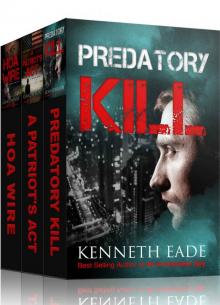 Brent Marks Legal Thriller Series: Box Set One
Brent Marks Legal Thriller Series: Box Set One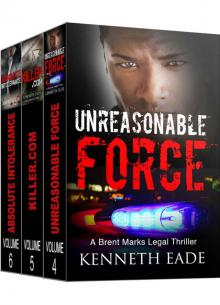 Brent Marks Legal Thriller Series: Box Set Two
Brent Marks Legal Thriller Series: Box Set Two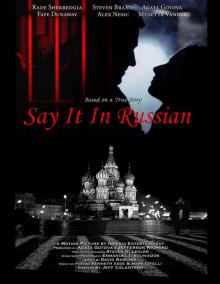 Say it in Russian
Say it in Russian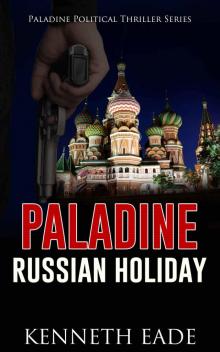 Political Thriller: RUSSIAN HOLIDAY, an American Assassin story
Political Thriller: RUSSIAN HOLIDAY, an American Assassin story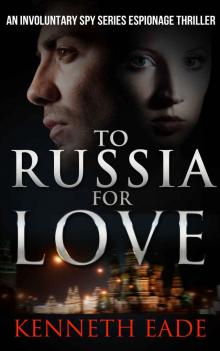 Spy Thriller: To Russia for Love: An Espionage and Pulp Fiction Political Thriller
Spy Thriller: To Russia for Love: An Espionage and Pulp Fiction Political Thriller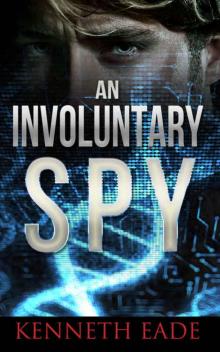 Spy Thriller: An Involuntary Spy: An espionage thriller
Spy Thriller: An Involuntary Spy: An espionage thriller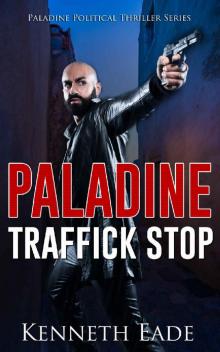 Traffick Stop, an American Assassin's Story (Paladine Political Thriller Series Book 3)
Traffick Stop, an American Assassin's Story (Paladine Political Thriller Series Book 3)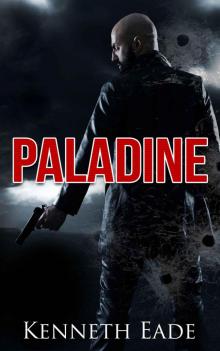 Paladine
Paladine